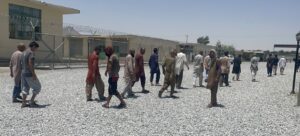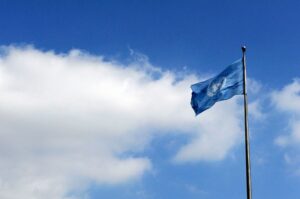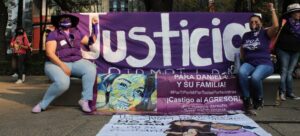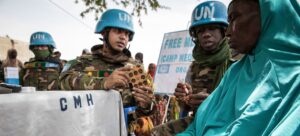The humanitarian role is what gets a lot of public attention as agreements are secured to arrange for aid to get through to civilians and to protect them, including trying to ensure that international humanitarian law (often called the laws governing war and broadly covered by the Geneva Conventions) are upheld.
The Gaza Strip prior to the current escalation.
What we hear less about is the political role as it is often played out away from the public eye. The UN Charter has several provisions that create a framework for mediation and conflict resolution and gives the Secretary-General the option to use his good offices to broker agreements in order to hopefully diminish tensions and lead to the steps that could help avoid war.
The Secretary-General’s role is covered in very broad terms by articles 98 and 99 of the UN Charter while peaceful settlement of disputes are outlined in Chapters VI and VII.
Much of this behind-the-scenes diplomacy never comes to light but it is a critical element to try and defuse crises and often gives rise to speculation about how and whether these powers have been exercised.
Clearly, the UN stands in a unique global position to broker peace. Since its inception in 1945, it has negotiated ceasefires, peace deals, and the establishment humanitarian corridors or other arrangements amid violence, including the Black Sea Initiative to allow for commercial food and fertilizer exports from key Ukrainian ports.
The announcement of the UN Secretary-General’s trip to Egypt on Thursday to meet with President Abdel Fattah Al Sisi is the latest of the UN’s intense around-the clock efforts to address the ongoing Gaza-Israel conflict, its rippling violence in neighbouring Lebanon and Syria, and obstacles to delivering lifesaving aid into the besieged Palestinian enclave.
The visit comes on the heels of multiple back-to-back night-time phone calls between the UN chief and key actors, a meeting in the pipeline with Israeli Prime Minister Benjamin Netanyahu, and possible contact with the de facto authorities in Gaza.
Here’s what’s been happening behind the scenes since the conflict erupted on 7 October:
Tor Wennesland (centre), UN Special Coordinator for the Middle East, and Philippe Lazzarini, head of the UN relief agency for Palestine refugees (UNRWA), meet with Egypt’s Foreign Minister Sameh Hassan Shoukry Selim (right) to discuss the conflict.
Hamas attacks: UN calls for de-escalation
In the hours after armed Hamas militants crossed into Israel, top UN officials reached out to key actors and called on both sides to de-escalate the crisis, show restraint, and protect civilians.
UN Secretary-General António Guterres and the Jerusalem-based Special Coordinator for the Middle East Peace Process, Tor Wennesland, strongly condemned the violence, raising grave concerns about targeting civilians, including the kidnapping of Israelis and airstrikes on Gaza. Other top UN officials and agency heads have been echoing those positions, adding their on-the-ground perspectives.
“Contacts with the Palestinian Authority are also going on on the ground,” UN Spokesperson Stéphane Dujarric told reporters at UN Headquarters in New York last week. “Contacts with the de facto authorities have to happen because they are the de facto authorities in Gaza. For us, this is not an issue of conditionality. All these things need to happen.”
The Middle East Quartet comprises the UN, European Union, Russia, and the United States. (file)
Engaging all sides
Reaching out directly to the parties and key players, Mr. Wennesland was in close contact with some members of the Middle East Quartet. Comprising the European Union, Russia, United States, and the UN, the group was set up in 2002 to drive forward the peace process, with a view to realizing a two-State solution that would see Israel and Palestine existing side by side in peace.
The “priority now is to avoid further loss of civilian life and deliver much needed humanitarian aid to the [Gaza] Strip,” Mr. Wennesland said in a social media post. The “UN remains actively engaged to advance these efforts”.
The Special Coordinator had been engaging parties in the region and key players long before the current situation erupted and provides monthly updates to the UN Security Council. On 27 September, he warned the Council of escalating violence amid Israeli settlement expansion and rising tensions.
Shortly after the Hamas attacks on Israel on 7 October, he reached out again to the parties as well as neighbouring Egypt and Lebanon.
The UN Special Coordinator for the Middle East Peace Process, Tor Wennesland (on screen), briefs the UN Security Council meeting in August. (file)
Brokering humanitarian corridors
In addition to the UN chief’s visit to Egypt, various avenues are being pursued in a bid to open a humanitarian corridor, or a safe space, to get life-saving aid into Gaza.
Last week, the Director-General of the World Health Organization (WHO) met with the President of Egypt.
In addition, Mr. Wennesland and the Commissioner-General of the UN relief agency for Palestinian refugees, UNRWA, sat down with Egyptian Foreign Minister Sameh Hassan Shoukry Selim in a “productive meeting”, the UN Special Coordinator said.
With a view to de-escalating the violence, Mr. Wennesland has also been “in close contact” with officials in the European Union (EU), Qatar, and the United States.
UNDOF units patrol Mount Hermon in the Golan Heights in the Israel-Syria border area year-round.
10,000 UN peacekeepers at work
The UN maintains no peacekeeping troops in Israel or the Occupied Palestinian Territory, but its more than 10,000 peacekeepers along Israel’s border regions intensified their work when rocket and artillery fire was reported in the vicinity this week.
Like all UN peacekeeping missions, the operations in Lebanon, UNIFIL, and Syria, UNDOF, are UN Security Council-mandated. Both missions are tasked with monitoring the respective ceasefire agreements among Israel and its two neighbours, from patrolling along the so-called Blue Line to monitoring such areas as Mount Hermon in the disputed Golan Heights.
As violence escalates along the Israel-Lebanon border, UNIFIL has been in constant contact with both nations.
Mandated to ensure stability in its area of operations and to protect civilians, UNIFIL personnel have the right to self-defence and may resort to the proportionate and gradual use of force under certain circumstances.
That includes ensuring its area of operations is not used for hostile activities; to resist attempts by forceful means to prevent UNIFIL from discharging its mandated duties; to protect UN personnel, facilities, installations, and equipment; to ensure the security and freedom of movement of UN personnel and humanitarian workers; and to protect civilians under imminent threat of physical violence.
The UN Security Council meets on the situation in the Middle East, including the Palestinian question.
UN Member States’ efforts
Meanwhile, UN Member States have taken collective steps to address the escalating situation. Following the UN Security Council’s 8 October closed-door emergency meeting, the 15-member organ considered a draft resolution this week and continues to discuss the urgent matter.
The Council has the power to call on countries to negotiate peace, and can even authorize the use of force, under Chapter VII of the UN Charter, in certain perilous situations.
Should the Council fail to act in its mandated role of maintaining international peace and security, the UN General Assembly, representing all 193 Member States, can call an emergency special session, as it did in 2022, six days after Russia’s full-scale invasion of Ukraine.
UN Secretary-General António Guterres briefs reporters on 11 October 2023 on recent developments in Israel and Gaza.
Peace broker: UN Secretary-General
Playing a key role in rallying the global community to resolve conflicts, the UN Secretary-General, the world’s top diplomat, and his envoys engage in shuttle diplomacy, meeting with parties to conflict, or bringing them together, to negotiate immediate or longer-term solutions, including ceasefires and access to vulnerable populations.
During crises, the UN chief with the support of the Political and Peacebuilding Affairs department, provides leadership and direction to UN agencies operating on the ground with a view to ensuring a swift, effective response.
He and his envoys also regularly inform the public about the latest developments in live press briefings or statements issued online.
“The Secretary-General will speak to whoever he needs to speak to,” the UN Spokesperson said, noting that the UN chief had, over the last week, a plethora of conversations, including with the ambassadors of Israel and of the five permanent Security Council members (China, France, Russia, United Kingdom, and the United States), and officials in Qatar.
That also included issuing an emergency appeal to Israel to halt its order for 1.1 million Gazans to evacuate south.
“The Secretary-General has not stopped working on this,” the UN Spokesperson said. “We urge all parties and those with influence over them to put an end to this tragedy.”



























